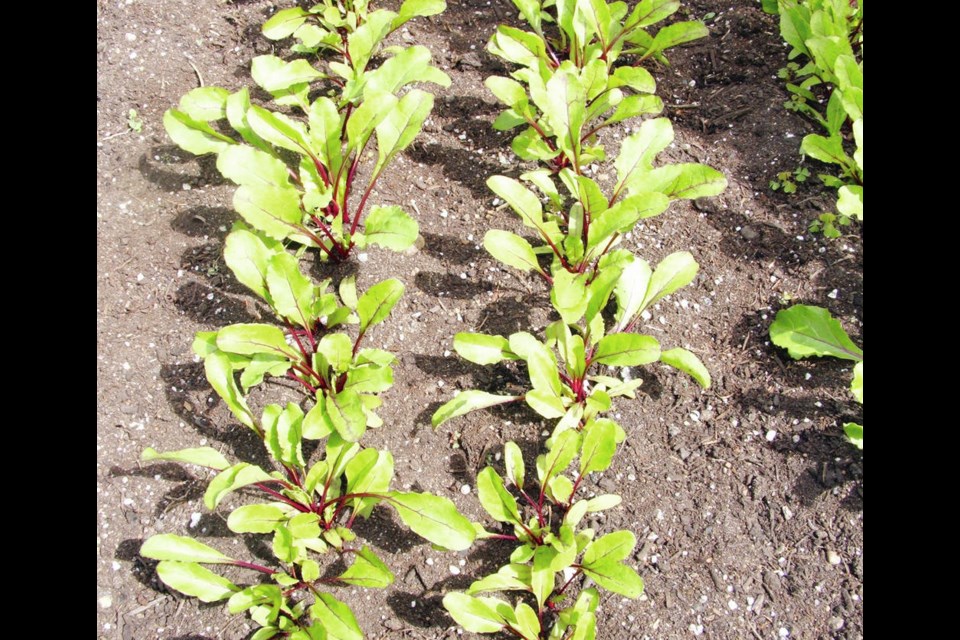As I set up a three-metre length of sturdy fencing for the tomatoes earlier in the month, I could not avoid the adjacent planting of carrots and beets. The young seedlings were developing nicely. So were an abundance of small weeds.
I often don’t get around to these root vegetable plantings until the weeds have grown lamentably large. Mighty victory this year. I lifted off their row cover, took out every weed, cultivated along the rows and watered carefully and thoroughly between the rows using a watering wand.
What a satisfying sight is a newly weeded plot of highly desirable edibles — a clean slate for now, but as we all know, a gardener’s work is never done. More weeds will appear as the beets and carrots develop. After a second weeding, next month, I’ll water deeply again and this time lay compost between the rows. I do the same with the onions, leeks and peas. The mulch nourishes the soil and helps to retain moisture — all good news for the plants and the quality of the food they yield.
As the days continue to warm and lengthen, amid the weeding, watering, dead-heading, potato hilling, mulching and pruning, stop now and then to sniff the roses, nibble on sun-warmed strawberries, and perhaps spend some leisure time in the garden with a congenial book.
Seed to Dust: Life, Nature, and a Country Garden by Marc Hamer (Greystone Books, 416 pages, hardcover, $34.95).
Hopeful and life-affirming are terms to describe the month-by-month reflections in this book. From January, when gardeners gaze at seed catalogues and delve into their “fantasy gardens,” through the green youth of spring, the flowering and seed-gathering of summer and to the ripening, hard work, fatigue and crumbling of the fading year — through it all there is insight and tranquil acceptance fuelled by the “heroism of love.”
Hamer writes of things gardeners know well, like the meditative, even poetic nature of hard, routine work that leaves the mind free to roam and the senses open to Nature’s song. Hard jobs need doing, “but I have to not work sometimes, too. My mind, my body, needs the space to rest.”
Anyone who has ever felt estranged by society’s “norms” and whose life has strayed off a “mainstream” path will find a kindred spirit here.
The book’s reflections cover a year of caring for the estate garden of a wealthy owner he calls Miss Cashmere. Some of the work is arduous. One day in May the gardener-narrator is cutting down brush at the front lane when a shiny black Mercedes stops beside him. A finely attired gent, accompanied by an elegant lady, asks directions.
“I am for a moment uneasy, in my dirt and scruff and worker’s clothes.” He begins to wonder at the “apparently wealthy and possibly glamorous lifestyle” of these people and whether he is envious of them.
“I think that I am not, because I am happy in what I do and how I do it. … Nevertheless, I feel like a bumpkin, unsophisticated,”
Still, if “sophisticated” means glamour and smart clothes, power and money, and “fitting in with a society of some sort, buying the right things … I begin to feel that being a bumpkin is a much more desirable thing to be.”
As the garden, and the narrator’s life, pass through the seasons, acceptance and delight remain: “My autumn has come and I’m ripening — how sweet that is!”
His lifelong search for meaning continues. He remembers: “A Sikh told me once that everyone was a flower in the Lord God’s garden — all the individuals, the colours and races, tribes and religions; it was an idea that I fell in love with, and kept coming back to over the years, and eventually I chose to be a flower.”
VHS meeting. The Victoria Horticultural Society is hosting a Zoom meeting on Tuesday, 7 to 8:30 p.m. Carla Gibson, executive director of Swan Lake Christmas Hill Nature Sanctuary, and Jay Rastogi, site manager, will review programs at the centre and speak about their role in educating people on the use of native plants. For more information on the sanctuary visit swanlake.bc.ca. Non-members can register for $5


